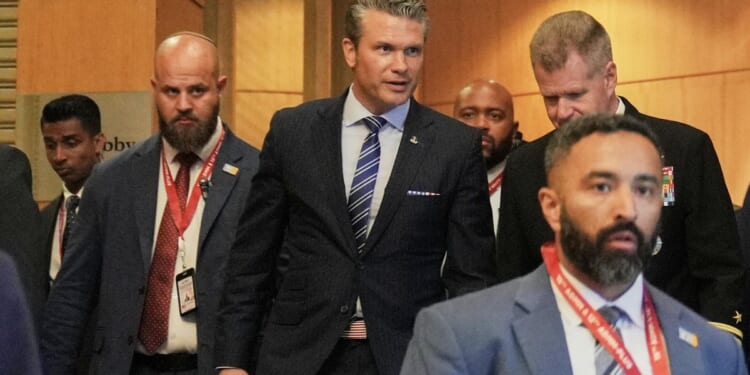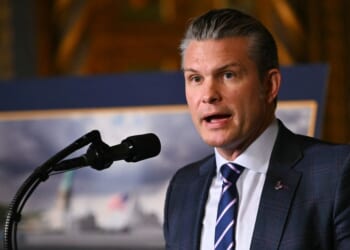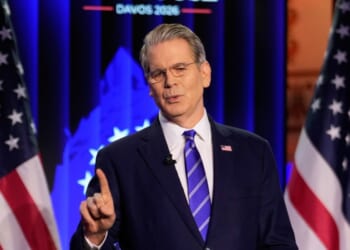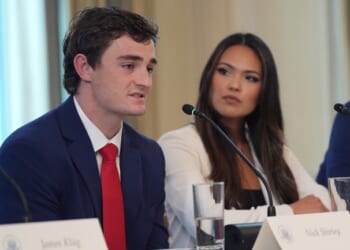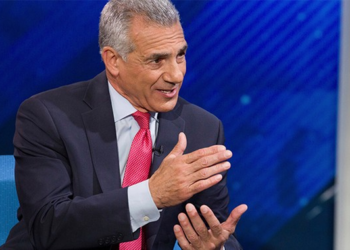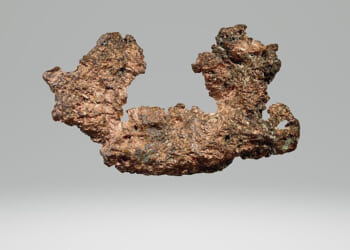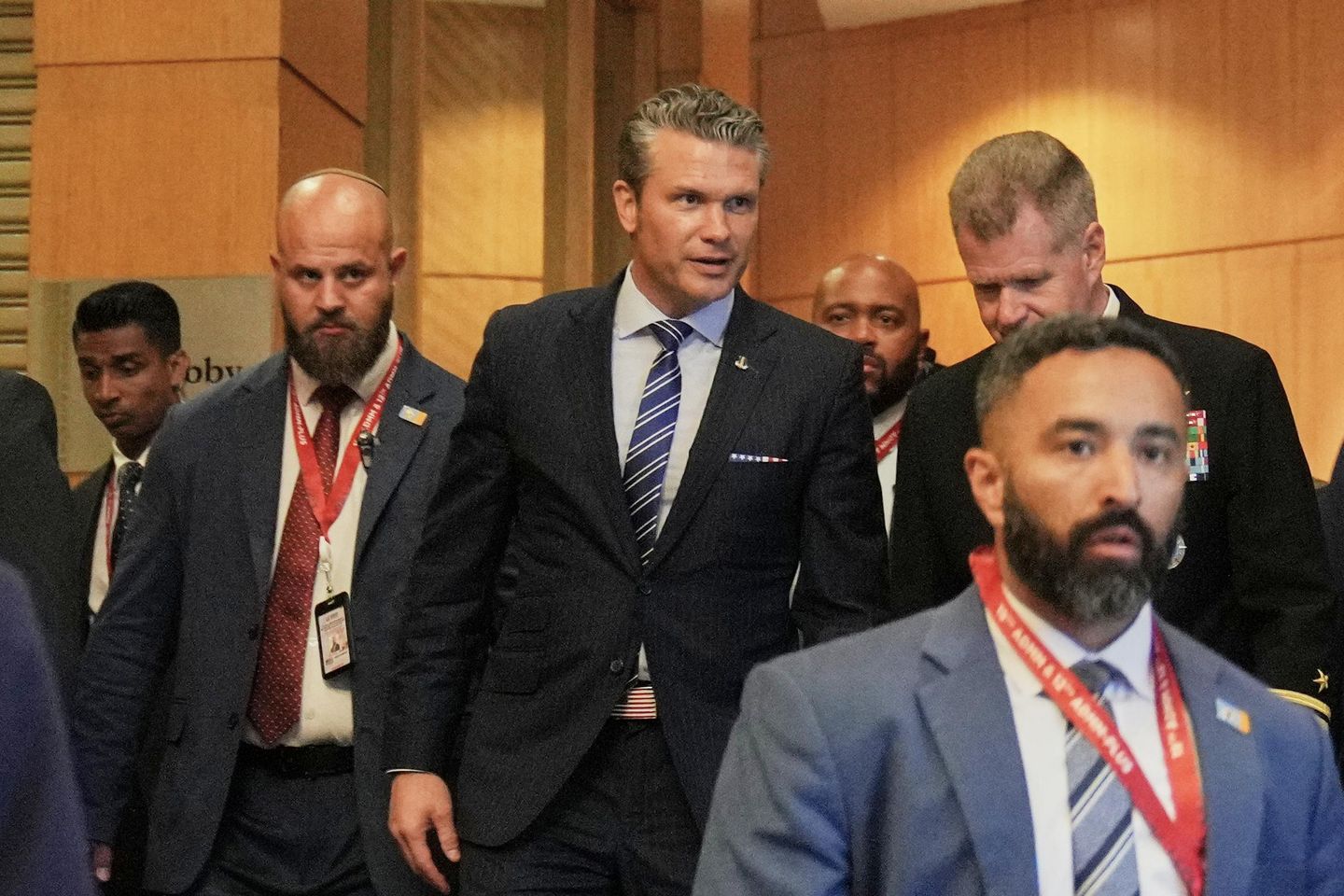
KUALA LUMPUR, Malaysia — Defense Secretary Pete Hegseth voiced “serious concerns” about Chinese military activities in the region during his first face-to-face meeting Friday with his Chinese opposite number.
“Secretary Hegseth highlighted the importance of maintaining a balance of power in the Indo-Pacific region,” the Pentagon said in a statement after the meeting with Adm. Dong Jun, the Chinese defense minister.
“He emphasized serious U.S. concerns about China’s activities in the South China Sea, around Taiwan, and towards U.S. allies and partners in the Indo-Pacific,” the Pentagon said.
Mr. Hegseth told Adm. Dong that although the United States does not seek conflict, “it will continue to stoutly defend its interests and ensure it has the capabilities in the region to do so.”
The meeting, their first since a video conference in September, marks a warming of defense relations and came a day after President Trump’s summit with Chinese President Xi Jinping on trade and overall bilateral relations.
“The Department of War will continue discussions with the People’s Liberation Army on matters of mutual importance,” the statement said, using the new name for the Pentagon that has not yet been formalized by Congress.
No other details of the talks were made public, and news reporters and photographers were blocked from covering the session, which lasted an hour and 20 minutes.
Past talks between the two nations’ defense leaders involved carefully scripted talking points in each sides’ opening remarks.
For China, the major issue remains Taiwan, a large island 100 miles off the coast that Beijing sees as a rebellious province and has vowed to annex, by force if necessary, as a “core” national interest.
U.S. talking points on Taiwan include declarations of U.S. policy of supporting the island under the 1979 Taiwan Relations Act, a law requiring U.S. military, diplomatic and other support for Taiwan despite the U.S. recognition of the People’s Republic of China.
Mr. Trump said before his meeting with Mr. Xi that he expected the Chinese leader to make demands regarding Taiwan but told reporters afterward that Taiwan was never raised during the meeting.
The Trump administration reportedly halted a $400 million arms package for Taiwan, possible timing the delay as a signal to China of U.S. interest in holding Thursday’s summit.
Military tensions over Taiwan remain high.
Since 2022, Chinese naval and air forces have conducted large and aggressive military operations around Taiwan that the commander of the U.S. Indo-Pacific Command, Adm. Sam Paparo, has called rehearsals for a future attack.
Chinese naval and coast-guard ships also have been engaged in what U.S. military officials say is a campaign of bullying against Philippines and other regional states over disputed islands in the resource-rich strategic waterway.
Mr. Hegseth said in an interview two days ago that the Pentagon will remain vigilant and ready for any confrontation with China through increased training and collaborating with allied militaries in the region.
American military forces are being strengthened with the goal of ensuring “that China understands that we have a credible deterrent,” he said.
Mr. Hegseth also said he hopes to have a good relationship with Adm. Dong.
“There is no intent from our side to coerce or confront, insult,” he said. “That’s not part of our calculation. We are just a strong nation … that realistically looks at the world, wants our allies to take it the same way. We are going to work with them to do that.”
Mr. Hegseth warned in a speech in May that the threat of war with China was real and imminent.
In the recent interview, he said it would be “irresponsible” for the U.S. not to recognize the dangers behind China’s rapid buildup of military capabilities.
The meeting here was the first in-person meeting between the two nations’ defense chiefs since May 2024, when then-Defense Secretary Lloyd Austin met Adm. Dong in Singapore.
Six months later, China declined to hold a second meeting with Mr. Austin to protest U.S. arms sales to Taiwan.
U.S. policy toward selling defense arms to Taiwan is based on the level of threat facing the unofficial U.S. ally.
The hour-long meeting Friday between Mr. Hegseth and Adm. Dong took place during a major conference of defense ministers hosted by the Association of Southeast Asian Nations
Chinese state media had no immediate comment on the Hegseth-Dong meeting.
On Thursday, Chinese Defense Ministry spokesman Senior Col. Zhang Xiaogang said China is open to developing military-to-military relations with the U.S.
He said in Beijing that he hopes the U.S. side will work with China “to jointly build a relationship between the two militaries that is equal, respectful, peaceful, stable and positive,” according to the Chinese Communist Party-affiliated Global Times.
Mr. Trump called his talks with Mr. Xi a major breakthrough in trade relations with China vowing to ease curbs on exports of rare-earth minerals needed by both U.S. military and civilian industry.
The U.S. will cut some tariffs on Chinese goods amid a worsening economy in China after Mr. Trump said China has helped stem the flow of precursor chemicals used in making the illicit fentanyl that has been killing tens of thousands of Americans in drug overdoses.
China also has renewed purchases of U.S. farm goods after temporarily halting the imports of soybeans.
“I guess on the scale from zero to ten, with ten being the best, I would say the meeting was a 12,” Mr. Trump said.
Mr. Xi told the U.S. president that the two nations should avoid “a vicious cycle of retaliation,” the state news agency Xinhua reported
“The economic and trade teams of the two countries exchanged in-depth views on important economic and trade issues and reached a consensus on resolving them,” Mr. Xi said.
Col. Zhang, the Defense Ministry spokesman, told reporters in Beijing this week that the People’s Liberation Army will crush any attempt at “Taiwan independence.”
“No matter how many weapons the Democratic Progressive Party authorities acquire, the cross-strait balance of military strength will remain unchanged, and the pursuit of Taiwan independence will remain a doomed cause,” Col. Zhang said, referring to Taiwan by the name of its current ruling party.
Col. Zhang also urged the United States to halt arms sales to Taiwan, commit to not supporting Taiwan independence.
Taiwan broke with the mainland in 1949 when Nationalist forces fled to the island at the end of the civil war won by the Communists.
U.S. policy recognizes that there is one China but has never recognized Chinese sovereignty over Taiwan and calls for the dispute to be resolved peacefully.
China has said it will never rule out the use of military forces against Taiwan.

